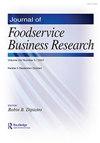The impact of using food influencers on consumer purchase intention with attitude toward influencers as mediator
Q2 Agricultural and Biological Sciences
引用次数: 0
Abstract
ABSTRACTSocial media influencers have cemented their place as pivotal elements within the broader marketing matrix, gaining recognition from corporate entities and academic circles. Notwithstanding, scholarly discourse on this phenomenon remains somewhat underdeveloped, requiring more comprehensive studies. This study is conducted to identify the main factors affecting consumers’ attitudes toward influencers and the impact of attitudes toward purchase intention. The population in this study is 333 university students in Hanoi following food influencers. The data analysis method used in this study is Structural Equation Modeling (SEM) with the SPSS & AMOS 22 program. The results reveal that various factors, such as trust, social attractiveness, specialization, experience, and perceived usefulness, significantly influence consumers’ attitudes. Customers’ attitudes, perceived usefulness, and credibility significantly influence consumers’ purchase intention. The research results will be helpful to businesses as well as individuals in understanding consumer behavior, thereby improving marketing and service strategies and attracting more potential customers.KEYWORDS: Social mediainfluencerfood industrypurchase intention AcknowledgementsThe author gratefully acknowledges the financial support from the Banking Academy of Vietnam. The author is thankful to the dedicated students from the Banking Academy of Vietnam for their invaluable help with survey distribution and data collection (Hien Le, Thao Pham, Hoang Dang, Hoa Vu, Thuong Ha).Disclosure statementNo potential conflict of interest was reported by the author(s).Ethical approval and consentAll participants were informed about the purpose of the research, their participation was voluntary, and they were assured that their responses would remain confidential and be used solely for the purpose of this study. Informed consent was obtained from all participants.Additional informationFundingThis study is funded and approved by the Banking Academy of Vietnam under Research Working Group NCM.04/2023.食品影响者对消费者购买意愿的影响,对影响者的态度为中介
社交媒体影响者已经巩固了他们在更广泛的营销矩阵中的关键元素地位,获得了企业实体和学术界的认可。然而,关于这一现象的学术论述仍不发达,需要更全面的研究。本研究旨在找出影响消费者对网红态度的主要因素,以及态度对购买意愿的影响。本研究的人群是333名河内的大学生,他们关注的是食物影响者。本研究使用的数据分析方法是结构方程模型(SEM),使用SPSS和AMOS 22程序。结果表明,信任、社会吸引力、专业化、经验和感知有用性等因素显著影响消费者的态度。顾客态度、感知有用性和可信度显著影响消费者的购买意愿。研究结果将有助于企业和个人了解消费者的行为,从而改进营销和服务策略,吸引更多的潜在客户。关键词:社交媒体影响力食品行业购买意向感谢作者感谢越南银行学院的资金支持。作者感谢越南银行学院的学生在调查分发和数据收集方面提供的宝贵帮助(Hien Le, Thao Pham, Hoang Dang, Hoa Vu, Thuong Ha)。披露声明作者未报告潜在的利益冲突。所有的参与者都被告知了研究的目的,他们的参与是自愿的,他们被保证他们的回答将被保密,并且仅用于本研究的目的。获得了所有参与者的知情同意。本研究由越南银行学院在研究工作组NCM.04/2023下资助和批准。
本文章由计算机程序翻译,如有差异,请以英文原文为准。
求助全文
约1分钟内获得全文
求助全文
来源期刊

Journal of Foodservice Business Research
Agricultural and Biological Sciences-Food Science
CiteScore
4.40
自引率
0.00%
发文量
52
期刊介绍:
The Journal of Forecasting is an international journal that publishes refereed papers on forecasting. It is multidisciplinary, welcoming papers dealing with any aspect of forecasting: theoretical, practical, computational and methodological. A broad interpretation of the topic is taken with approaches from various subject areas, such as statistics, economics, psychology, systems engineering and social sciences, all encouraged. Furthermore, the Journal welcomes a wide diversity of applications in such fields as business, government, technology and the environment.
 求助内容:
求助内容: 应助结果提醒方式:
应助结果提醒方式:


